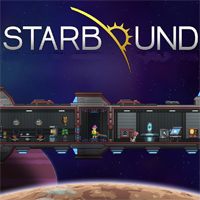Day 5 | Survival Guide
Last update:

You have already learned to control your character, the process of distributing the blocks and of crafting new tools, you have set out for hunting, learned about the hunger system, fought dangerous opponents and even learned about mining and gardening. There is the final lesson to be learned. On day 5, you will learn everything that there is to know, about the most important element in Starbound - the spaceship.
The spaceship
So far, in your explorations, you have been restricted to one planet only. The world of Starbound is much more than that, however. In the game, there are hundreds of thousands of procedurally generated stellar systems. Each system has a number of unique planets, with their own biomes, gravity, monsters and dwellers. All of this has been divided into 5 sectors of separate difficulty levels. As of now, you are staying at your starting planet in the Alpha sector but, the problem with lack of fuel, which you had before, is non-existent anymore. If only you want to, you can start the engines and fly off to another planet or a completely different system.

Start by returning to your ship. To do that, click on the teleportation symbol next in the tab bar on the right. You need to be standing at the planet's surface to be able to teleport.. Once you are back aboard, walk on to the ship's bridge on the right. Right in front of the pilot's chair, you will notice a white panel with a gauge - Fuel Hatch. This is where you place the fuel supplies, which are then converted into fuel units, which you need for interplanetary journeys. At this moment, you have access to the basic kind of fuel- Coal. One lump of coal corresponds to 2 fuel units. To reach the neighboring planet, you are going to need 50 fuel units, and the journey to another stellar system, or sector, takes 200 fuel units. From the coal that you have mined earlier, you should obtain 200-400 fuel units. Although this amount is sufficient to get to another stellar system, it is a good idea to top the tank up. Some of the planets have, relatively, small deposits of coal, which is why it is safer to travel with large supply of fuel. The tank can hold, up to, 1000 fuel units, which corresponds to 500 lumps of coal. To add fuel, activate the panel, put coal into one of the slots and [press the Fuel button.
If you have refueled and the engine is ready to go, the only thing you need to do is learn about the basics of the Navigation Console. To activate it, click on the pilot's chair. The navigation panel has several interesting functions. The first one of them is Set Home. This allows you t o specify one planet as your main base and save the location, thanks to which you will be able to return there after you select Go Home. Another function is the map of the galaxy. Thanks to the map, you can learn about the nearby planets and mark your destination manually. The final function is the panel of coordinates. There are two coordinates: X and Y. If you have the exact coordinates of a planet, you can enter them here, find the specific planet and set it as your destination. It is also possible to select random coordinates, by pressing Find Random.
This is all of the information necessary to handle the ship. If you are going to check out the other planets, and you want to return to your start planet in the future, remember that you can mark it with the Set Home function.
You are not permitted to copy any image, text or info from this page. This site is not associated with and/or endorsed by the Chucklefish or Chucklefish. All logos and images are copyrighted by their respective owners.
Copyright © 2000 - 2025 Webedia Polska SA for gamepressure.com, unofficial game guides, walkthroughs, secrets, game tips, maps & strategies for top games.
